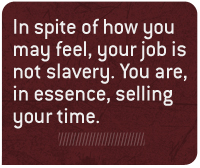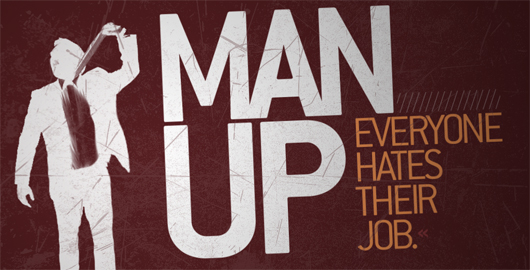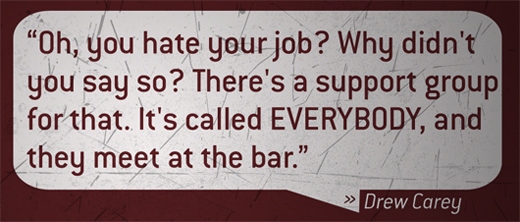Hate your job? Guess what – you’re not special. The wild popularity of Fight Club, Office Space, The Office, Clerks and other movies about hating your job serve as hard evidence that the “disgruntled working man” is not exactly a niche demographic. But when Peter Gibbons complains about TPS reports, it’s funny. When you drone on about your crap-ass job, it’s obnoxious.
We know already: your boss sucks, your salary sucks, your co-workers suck, your commute sucks, your benefits suck, heck, with so much suck in the room it’s starting to feel a little bit like you suck. Loathing your job, it seems, is par for the course. But does it have to be? If it feels like you have a potential “case of the Mondays,” and are having trouble stomaching the ol’ rat race, you should consider some lessons from some actual rats.
Check this out.
Some disturbingly sadistic scientists took three rats and put them each in a little box-like container. You could almost call it a cube, or maybe even a cubicle. These three rats were walled off in their little cubes with nothing but their tails sticking out. For 21 hours, the scientists administered shocks to the rats at random intervals. All the rats received the same amount of shocks – however, one of the rats had the ability to deactivate the shocks by pressing a button. He quickly figures this out and whenever the shocks come, he starts pounding away at that little button. The other rat, meanwhile, is getting shocked off and on and has no clue what’s going on.
At the end of the study, the scientists compared the amount of “stomach lesions” (i.e. ulcers) each rat developed due to the shocks. As it turns out, although both Rat A and Rat B received the same amount of shocks, Rat B had twice as many ulcers as Rat A. (Rat C, by the way, was a control rat. He’s just chillin’ and has no ulcers.)
So, what’s the X factor? Control.
Look – everyone has to work to make a living (except, of course, the trust fund babies who live off of mommy and daddy for their entire lives – but I know none of those types read Primer). We all put in our 40+ hours a week, we all get shafted by middle management, we all get our thunder stolen from co-workers. In short, we all get the same level of shocks in our little cubicle.
But the key to escaping the pain and suffering of a workaday existence isn’t crying to your LiveJournal about being passed up for a promotion or boring your date with epic complaints about the smarmy IT guy who keeps deleting your iTunes. The only way out is to gain control over the stressors in your career. For the rat, control was given to him by his quasi-benevolent overlords. But you’re a man, not a mouse. And it’s your job to seize control. Here’s how to do it:
Change Your Outlook
Stress is a mental thing. As we learned from the rats, it’s not about how many shocks you receive, it’s how you respond to the shocks. Poor Rat B rightfully considered himself a victim, subjected to a cruel, unusual and inexplicable regimen of torture. And this is how many disgruntled workers view their situation.
This may or may not be true. If it is, you should go ahead and skip down to the last section. But chances are, it’s not. We largely focus on the frustrations surrounding our jobs and often ignore the value of our toil. Instead of loathing your cubicle as a prison, you really should be rejoicing for the freedom it grants you. The freedom to pay the rent, stay out of debt, pay off student loans, go out drinking with friends, buy an X-Box, rent movies, go on dates. All of that takes money and that’s what your job gives you. In this economy especially, you should be thankful for being privileged with a job to complain about.
In spite of how you may feel, your job is not slavery. You are, in essence, selling your time. And depending on your line of work, you are leasing your mind and
With that being said, make clear divisions between work and personal life. Don’t bring your frustrations home with you. Don’t log into Outlook from your apartment. Dedicate yourself fully to your job when your there and dedicate yourself fully to your personal life when you’re not. Because if you let them invade your private space, then you are basically giving them more of your time and energy than you bargained for.
Think of it this way: when you’re punched in, you’re playing a role. Alexandra Levitt mentions something like this in her book, They Don’t Teach Corporate in College. She calls it a “corporate persona.” This is the professional version of yourself that only cares about doing your job and serving the company. At the end of the day, go ahead and feel free to take the mask off.
Change Your Expectations
What have you learned after five grueling years at the same job? Are the same things ticking you off? Are the same people grinding your gears? If so, then there’s something you need to understand: you can’t change people.
BusinessWeek writer Peter Bregman wrote an article on how to keep annoying coworkers from stressing you out. He writes:
Here's my advice: don't go to a hardware store and get upset when they won't sell you milk.
[…]
Because the world is more global and organizations are more diverse, the likelihood we will interact with people very different from us is increasing exponentially. And people who are different from us do things we don't expect or want them to do. Sometimes they don't look at us when we speak to them. Sometimes they talk back. Sometimes they don't talk at all. They defy our expectations, and we feel frustrated.
[…]
So instead of getting frustrated with other people, learn their rules of engagement. If you pretend each person is from a foreign country you don't fully understand, you'll be more open to accepting him or her.
Think of every interaction as an experiment that explains a little bit more about the individual you're dealing with. Then, when someone defies your expectations, don't get mad. Just change your expectations to more accurately align with reality. Once you understand your colleagues' operating instructions, you might decide to approach them differently. Use different words. Be more or less aggressive.
Expecting the world to play by your rules and always engage you according to your preferences is borderline insanity. You can’t change how people treat you, but you can change how you treat them. Some may view this as letting people walk all over you, but if done with class and tact, it won’t be. More importantly, it’s taking action into your own hands in a non-confrontational way. It’s pushing that button to lessen the shock.
Step Up
There’s another way of thinking about your job that can ease the pain. Consider it a stepping stone. Our culture doesn’t reward those who don’t pay their dues and nobody starts out in the corner office. If you’re stuck in the mail room, then it’s probably due to one of the following reasons:
You are new around here
Like I said, nobody walks out of college and into a cushy executive position. You may know that you have what it takes to take on a bigger role and go on to greater things, but before you ascend, you’ve got to prove it to the powers that be. Consider your stint as a gofer or a junior minion as your opportunity to show your stuff. If this job is child's play to you, prove it by outperforming.
You don’t deserve a promotion
Similar to the above point, if you find yourself languishing in the dregs of your company’s corporate structure for several years, the problem might be you. Being stuck in a rut is somewhat of a self-fulfilling prophecy: you resent the job you hate so you begin slacking. You do just enough to squeak by and spend the rest of the time gazing out the window, fantasizing about whatever it is you’d rather be doing. But don’t fall into this trap. If you have seniority in your department, use your expertise and experience to get noticed, not to subsidize your laziness.
There aren’t any opportunities
Dead end jobs exist. If your company isn’t growing or if the man (or woman) that has your job has no intention of retiring within the next century, then you truly are stuck. If that’s the case, then you need to make a lateral exit. And to do so, you’re going to need some good references and contacts. Keep your head up while you’re on the clock, but start investigating other avenues for your career. Use your years of experience at your current job in order to leverage a similar position elsewhere. That way, your joyless toil won’t have been totally in vain.
Diversify
Decades ago, it was completely normal to work for the same company from graduation to retirement. But with layoffs around every turn in the market and the promotions pool dwindling, being a company man for life simply isn’t a viable model anymore.
The dangers of having just one occupation isn’t only that you only have a single stream of income. When you only wear one hat, you only have one way of feeling productive, one industry circle to build contacts in, one trade to gain experience in, one way to make your mark on the world. Because of this, when things start getting disappointing at work, it can feel like everything is falling apart.
So, what if you had some more irons in the fire? The prospect of your job going away or your boss giving you hell get exponentially less daunting when you have something to fall back on.
You need to have a multi-faceted life – especially if you’re unhappy with your career. Instead of trudging into the office, struggling to make it through the day and then coming home and flopping on the couch, start working on a side project. Wake up an hour early each day and work on a blog. Get serious about your hobbies. Read, for God’s sake, read about subjects that interest you and read books instead of just magazines and blogs. Keep fresh on that foreign language you enjoyed learning in college. Do something that challenges you and stimulates you, even if you only have a little bit of time to work on it each week. At the very least, it will give you a greater sense of identity and purpose beyond being a worker bee. At the very best, it will eventually become your dream job.
Quit
If all else fails, do what I did: quit. Take a look at some of the warning signs for an abusive relationship and ask yourself if this sounds like your relationship with your employer:
- Is jealous or possessive
- Controls you by being overly bossy or demanding
- Isolates you by demanding you cut off social contacts and friendships (overtime, anyone?)
- Loses temper quickly
- Blames for emotional states
- Blames you when they mistreat you
- Has a history of bad relationships (high turnover?)
Also ask yourself if:
- You’re family or friends have recommended you end the relationship
- You worry about how they will react to things you say or do
- You have difficulty ending the relationship, even though you know deep inside that it's the right thing to do.
Granted, these warning signs are meant to be applied to person-to-person relationships, but the signs are the same for a job that simply doesn’t suit you. If the things you hate about your job outweigh the redeeming aspects, then there’s no reason for you to stick around.
But as always, you gotta keep your cool. (This was easier for me, since my workplace wasn’t exactly an abusive relationship.) Don’t burn bridges and don’t do anything that will sabotage your chances of getting another job. Because the point of quitting your job is to find a better one. Just like your plans for stepping up, start planning your escape quietly on your own time and when the time is right, exit stage left. It likely won’t be easy, but it will help to have a light at the end of the tunnel.
What it all boils down to is this: there are healthy ways to deal with job dissatisfaction and there are less productive (and frankly annoying) ways to do so. You can be like Rat A and take control of your situation, or you can be like Rat B and be a victim. After all, stress, boredom and frustration are all things that come from within you. And it’s a heck of a lot easier to change yourself than it is to change the world. Society runs on crappy jobs and the man who can take that job and do something positive with it will rise above.



















